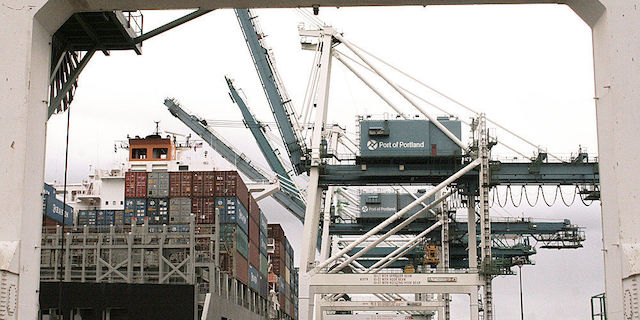Private Treaty February 2025
Pacific Cattle Angus, Sim-Angus, and Simmental range-raised production fall bulls available by PRIVATE TREATY FEBRUARY 2025 Carl Wisse • carl@pacificcattle.com www.pacificcattle.com • 509-539-6850 • Eltopia, WA
Published 11:27 am Tuesday, February 4, 2025

President Trump on Monday paused new tariffs on Canada for 30 days, while China counterpunched with tariffs on U.S. oil, coal, natural gas, farm equipment and vehicles.
Trump reset 25% tariffs on Canada to March 4, stating in an executive order Canada had agreed to take immediate steps to intercept illegal immigrants and illicit drugs at the border.
Canada called off its retaliatory 25% tariffs on U.S. goods, including agricultural products.
Canadian Prime Minister Justin Trudeau said on X Monday that he had a “good call with President Trump” and that Canada was implementing a $1.3 billion plan to secure the border.
Canada had previously announced the plan in mid-December. “I have also signed a new intelligence directive on organized crime and fentanyl and we will be backing it with $200 million,” Trudeau stated.
China’s state-owned media, Xinhua, reported Monday that China will impose new 15% tariffs on U.S. coal and natural gas and 10% tariffs on oil, farm machinery, some cars and pickups.
The tariffs will take effect Feb. 10. The Chinese government also filed a complaint with the World Trade Organization.
An identified spokesman for the Chinese embassy in Washington, D.C., said in a statement Tuesday that China deplores Trump’s tariffs.
“China has taken necessary countermeasures in accordance with relevant laws and regulations and the basic principles of international law,” the spokesman said.
Trump imposed tariffs on Canada, China and Mexico on Feb 1, on top of existing tariffs. The president accused all three countries of doing too little to prevent illegal immigration and drug trafficking into the U.S.
China, Mexico and Canada are the top three foreign destinations for U.S. farm goods, making up one-third of all U.S. agricultural exports, according to the USDA. Farm groups are widely apprehensive about Trump’s tariffs setting off trade wars that will hurt U.S. farmers.
Trump paused 25% tariffs on goods from Mexico for 30 days on Monday after Mexican President Claudia Sheinbaum agreed to send 10,000 soldiers to secure the southern border.
The Trump administration will continue negotiating with Mexico and Canada over border security in the next month, according to the new White House orders on tariffs.
In getting the same 30-day reprieve as Mexico, Trudeau said he will appoint a “fentanyl czar,” list cartels as terrorists and launch a “Canada-U.S. Joint Strike Force” to combat fentanyl, organized crime and money-laundering.
Canada announced some of the measures described Monday by Trudeau on Dec. 17. Canadian officials said then it was beefing up border security with more agents, dogs, helicopters and drones and would propose creating a U.S.-Canada strike force to target transnational organized crime.
The Feb. 1 executive orders imposing tariffs stressed border security to stop the flow of illegal immigration and illicit drugs. Trump told reporters Jan. 31 that he also plans to impose new tariffs on the European Union, as well as computer chips, steel, aluminum and copper.
Trump said he anticipated some short-term disruptions in the economy, but that in the long-term tariffs will strengthen the country.
Trade wars during Trump’s first term cost farmers a total of $27 billion in lost exports in 2018 and 2019, the USDA estimated. Farmers received $23 billion in compensation.
The Trump administration and China signed a trade deal in 2020, with China committing to buy more U.S. farm goods in 2020 and 2021.
China fell short of its commitment due to diversifying its farm economy and slowdowns in trade caused by COVID, according to a report by the Congressional Research Service.
American Farm Bureau Federation President Zippy Duvall hailed the postponement of the North American tariffs.
“Farm Bureau is encouraged that the United States and Mexico have agreed to delay the use of tariffs for the next month. Tariffs and tariff retaliation often hit farmers and ranchers hard, which make it more difficult for them pay their bills and grow the food America’s families rely on.
“We understand there is a similar conversation taking place with Canada to avoid costly trade disruptions, and we appreciate the Administration making every effort to resolve these disputes, keep international markets accessible and ensure a stable food supply here at home.”